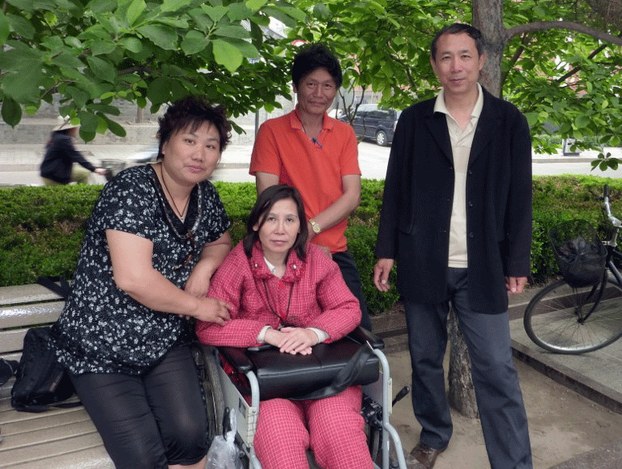




Wheelchair-bound eviction activist Ni Yulan, 52, was sentenced in April 2012 to a two-year prison term following her conviction on charges of “fraud” and “causing a disturbance” by the Xicheng District People’s Court in Beijing. The sentence was later reduced by two months.
Her husband, former schoolteacher Dong Jiqin, was also convicted of creating a disturbance and was handed a two-year term.
Ni was released on Oct. 7 after serving her full jail term in spite of repeated requests from her family for medical parole, citing a lack of adequate treatment for a growth in her thyroid gland.
She told RFA on her release that she was met at the jail by her husband and daughter, and is now living in rented accommodation in Beijing.
"Now that I have been released, I will be seeking out the relevant departments to lodge an appeal, and to call for a renewed investigation and for the truth to be restored," she said.
"It has been 12 years since I was beaten up and crippled. I need to continue to seek medical attention for a host of medical issues, including my injuries [from that beating], after I lost access to adequate medical treatment when they locked me in jail."
"I will also demand that those responsible for torturing me, forcing confessions out of me and forcibly demolishing my family home and confiscating our family property will be pursued and brought to justice."
"I don't care what means they try to use to take away our rights; we will resist in our own way," she vowed.
Medical issues
In a separate interview, Ni told the U.S.-based group Human Rights in China (HRIC): "Our basic right to exist is being deprived."
She said she received visits from staff members of foreign embassies in China, which she believed prevented her treatment in jail from deteriorating, however. "The attention and appeal from the international community contributed to my improved treatment in prison," she told HRIC.
Ni described her daily routine in prison as being extremely painful, the group said in a statement on its website.
"I had to get up before 6:00 a.m., and had to, like normal people, attend ‘study classes’ until 10:00 p.m. Every day I had to endure this for 16 hours. My back and legs hurt, and I was weak all over. I can no longer walk even with crutches," she said.
Meanwhile, Ni told RFA her thyroid tumor had grown during her two year jail term, after the authorities had dismissed it as a benign condition in no need of treatment.
She said she still has trouble sleeping at night, and suffers from muscle wastage from her confinement in a wheelchair.
However, she said she would continue to appeal against the decision to imprison her.
"We will continue our appeal," Ni said. "We will have to go through many more legal procedures."
"Protecting one's rights isn't a simple matter."
Jasmine activists
Ni and Dong were detained amid a nationwide round-up of dissidents and rights activists sparked by online calls for a "Jasmine Revolution" inspired by the 2011 Arab Spring protests in the Middle East.
Ni's fraud conviction sprang from allegations by police that she claimed to be a lawyer after the authorities revoked her business license in retaliation for her work on behalf of evictees in Beijing.
Their homes had been demolished to make way for construction projects linked to the city's hosting of the 2008 Olympic Games.
The jail term is the third conviction for Ni, who had already served jail terms in 2002 and 2008 for "obstructing official business."
She has reported extensive torture and harassment at the hands of the police, and the couple's home was demolished by the Xicheng district government in 2008, rights groups say.
Reported by Wen Yuqing for RFA's Cantonese Service, and by Xin Yu for the Mandarin Service. Translated and written in English by Luisetta Mudie.